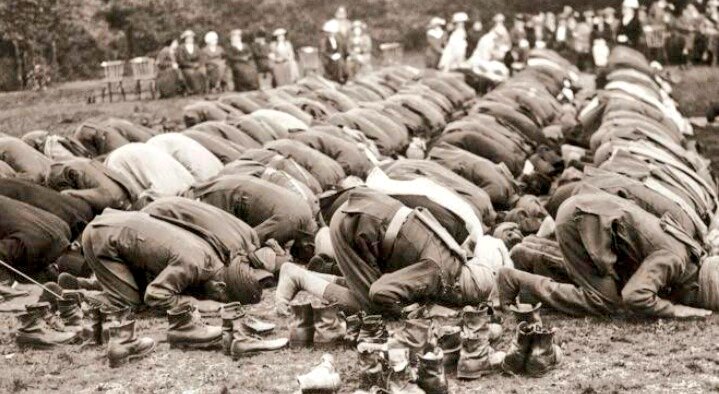
As the world pays homage to the soldiers who fought World War 1, we must not forget that as many as 74,187 soldiers from today's India and Pakistan died in this war. Their stories, and their heroism, were largely omitted from British popular histories of war or...
#ArmisticeDay

#ArmisticeDay


..relegated to footnotes. The number of soldiers and support staff sent on overseas service from British India during World War I was huge: among them 588,717 went to Mesopotamia, 116,159 to Egypt, 131,496 to France, 46,936 to East Africa, 4,428 to Gallipoli, 4,938 to Salonica... 



...20,243 to Aden and 29,457 to the Persian Gulf. Among these soldiers, 29,762 were killed, 59,296 were wounded, 3,289 went missing, presumed dead, and 3,289 were taken prisoner. Of the total of 1,215,318 soldiers sent abroad there were 101,439 casualties. 

British India contributed a number of divisions and brigades to the European, Mediterranean, Mesopotamian, North African and East African theatres of war. India’s contribution in men, animals, rations, supplies and money given to Britain exceeded that of any other nation. 

In historical texts, it often appears formally that Government of British India ‘offered’ assistance to the British and that His Majesty’s Government ‘graciously accepted’ the offer to pay unfairly large amounts of money, including a lump sum payment of £100 million as special.. 

...contribution to HMG’s expenses towards a European war. This elides the fact, of course, that the ‘Government of India’ consisted of Englishmen accountable to His Majesty’s Government in Britain.
The British raised men and money from India, as well as large supplies of food...
The British raised men and money from India, as well as large supplies of food...
..cash and ammunition, collected both by British taxation of Indians and from nominally autonomous princely states. In addition, £3.5 million was paid by India as the ‘war gratuities’ of British officers and men of the normal garrisons of India. A further sum of £13.1 million...
..was paid from Indian revenues towards the war effort. It was estimated at the time that value of India’s contribution in cash and kind amounted to £146.2 million, worth some £50 billion in today’s money. In Europe, soldiers from British India were among the first victims...
..who suffered the horrors of trenches. They were killed in droves before the war was into its second year and bore the brunt of German offensive. Jawans from subcontinent stopped the German advance at Ypres in autumn of 1914, soon after the war broke out, while the British...
...were still recruiting and training their own forces. Hundreds were killed in a gallant but futile engagement at Neuve Chapelle. More than a thousand of them died at Gallipoli, thanks to Churchill’s folly in ordering a badly-planned assault reminiscent of the Crimean War.
Letters sent by soldiers of British India who were deployed in France and Belgium to their family members in their villages back home speak an evocative language of cultural dislocation and tragedy. ‘The shells are pouring like rain in the monsoon’, declared one. ‘The corpses... 

..cover the country like sheaves of corn’, wrote another.
These men were undoubtedly heroes: pitchforked into battle in unfamiliar lands, in harsh and cold climatic conditions they were neither used to nor prepared for, fighting an enemy of whom they had no knowledge, risking...
These men were undoubtedly heroes: pitchforked into battle in unfamiliar lands, in harsh and cold climatic conditions they were neither used to nor prepared for, fighting an enemy of whom they had no knowledge, risking...
their lives every day for little more than pride. Yet they were destined to remain largely unknown once the war was over: neglected by the British, for whom they fought, and ignored by their own country, from which they came. Part of the reason is that they were not fighting...
..for their own country. None of the soldiers was a conscript: soldiering was their profession. They served the very British empire that was oppressing their own people back home.
In return for British India’s extraordinary support, the British had insincerely promised to...
In return for British India’s extraordinary support, the British had insincerely promised to...
...deliver progressive self-rule to British India at the end of the war. Perhaps, had they kept that pledge, the sacrifices of soldiers in World War I might have been seen in their homeland as a contribution to freedom. 



Reference:
An Era of Darkness: The British Empire in India by Shashi Tharoor
An Era of Darkness: The British Empire in India by Shashi Tharoor
• • •
Missing some Tweet in this thread? You can try to
force a refresh













